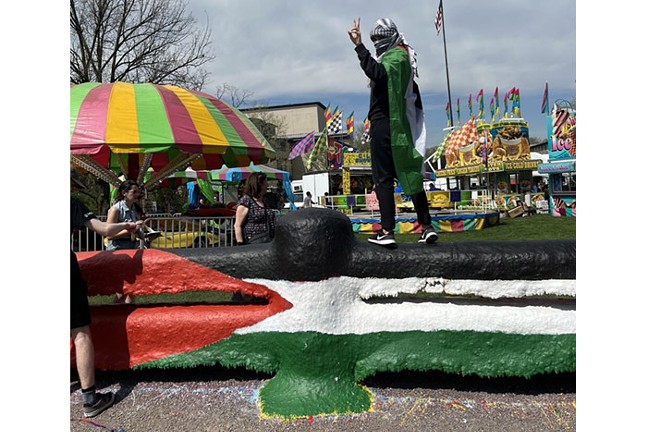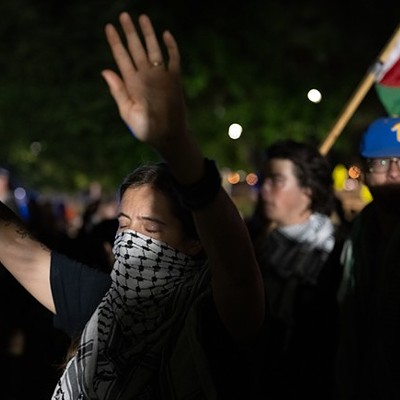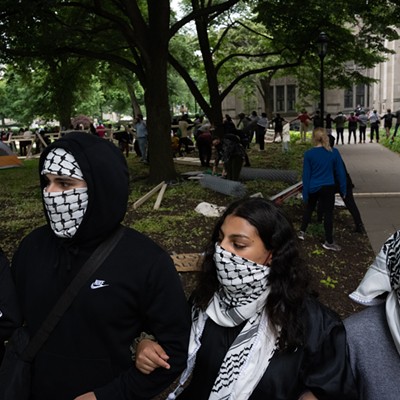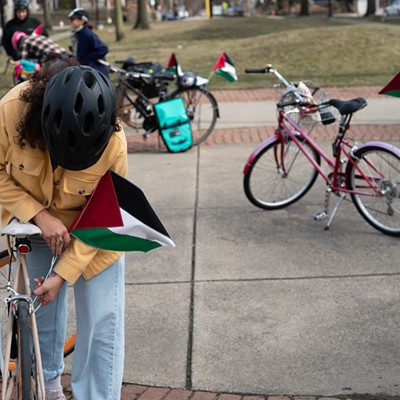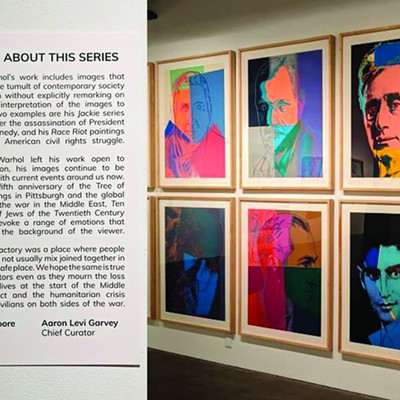Yara Doumani participated in a longstanding Carnegie Mellon University tradition Friday by painting a campus fence with a message near to her heart: “Free Palestine.” But within hours, her work was vandalized, leaving many among the Arab and Palestinian community at Carnegie Mellon University feeling unsupported.
Doumani, a member of the university's Arab Student Organization, says she was shaken by the response.
“It was completely ruined and we were just in so much shock,” Doumani says. “We do understand that the Palestinian conflict is not that easy and some people don't agree with that view, but the fact that they like vandalizing something that's against school laws and showed how childish they were being.”’
The tradition of painting the fence in front of Doherty hall — considered the “unofficial university billboard”— typically takes place between midnight and sunrise by students who then stand guard as long as they want their message to stay. Whatever the contents of the message, painters adhere to a number of general rules, outlined on a student-run instagram page.
According to those rules, the fence can only be painted by one group per night. Additionally, it is considered “vandalism,” if a group dumps paint instead of using brushes to paint the fence and if a group paints over its existing coat before 24 hours.
Doumani said the fact that students chose to vandalize the fence showed they were expressing an opposing ideology.
“Yes, it was just a vandalism thing, but this shows that people were willing to break the rules, just so they can bring their own views forward,” Doumani says.
Since the vandalism, some ASO members chose to repaint their work during the day. The “Free Palestine” and Palestinian flag colors remained on the fence on Friday and Saturday.
The Israeli-Palestinian conflict dates back to the end of the nineteenth century. In 1947, the United Nations passed Resolution 181, known as the Partition Plan, which divided the land into Arab and Jewish regions. The following May, the Israeli state was created, sparking the first Arab-Israeli War. Israel won the war in 1949, but 750,000 Palestinians were displaced and the territory was divided into 3 parts: the State of Israel, the West Bank and the Gaza Strip. Since then, tensions and violence have continued to exist between the two groups within the region.
Doumani says the fence had no specific mention of Israel other than its support for Palestine. She emphasized that the Muslim Student Association’s part in painting the fence does not make it a religious issue.
“This is not like a religious conflict,” Doumani says. “This is like a political one.”
This is not the first time the fence has been vandalized. In 2020, when a group painted the message “Black Lives Matter,” another group quickly repainted the fence to say “All lives Matter,” a move met with considerable backlash from the CMU student community.
Carnegie Mellon University said in a tweet in response to the 2020 vandalism incident that “While CMU doesn’t typically comment on speech conveyed in this student-regulated forum,” they do stand with the Black Lives Matter message.
Doumani said she wishes the University would provide the same support for this incident of vandalism as well.
“When we reached out to the CMU fence account they ignored us, and same thing with CMU they never said anything about the fence being vandalized, they didn't even talk about it,” Doumani said. ‘And generally I feel like the Palestinian students on this campus just do not get the support they need.”
Doumani said the Arab Student Organization and the CMU Muslim Student Association plan on sending a letter to the University asking for acknowledgement of the incident and an apology.
“I feel like it was really important to actually speak up about it, especially towards the administration so that they kind of understand our point of view,” Doumani says. “So I feel like having an open discussion definitely worked a lot better than vandalizing the fence.”
Gina Casalegno, CMU’s vice president for student affairs and dean of students, says she “appreciates” the efforts of the student government to better clarify the rules and address the “recent incident.” Casalegno did not specifically address the question of whether the University will specifically show support for the Palestinian and Arab community on campus.
“Transcending the rules of the Fence is our commitment to civic discourse and to building a sense of belonging for all members of this community, even when deeply-held views diverge from one another,” Casalegno said in a statement. “We will continue the work of the Commission on Academic Freedom and Freedom of Expression as we uphold freedom of expression as a core university value, one that welcomes diverse perspectives and supports a climate of respectful dialogue.”
Doumani says the group has “some idea” who the person who vandalized the fence is, and they hope to work with the potentially involved organizations to seek some repercussions for the individual. However, it is not confirmed that the suspected individual is solely responsible for the vandalism. The University does not disclose specific consequences for students who violate the rules of the fence.

